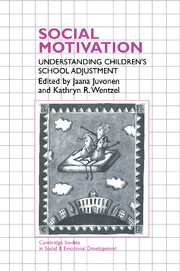1 - Introduction: New perspectives on motivation at school
Published online by Cambridge University Press: 22 October 2009
Summary
The social worlds of children are a pervasive and influential part of their lives at school. Each day in class, children work to maintain and establish interpersonal relationships, they strive to develop social identities and a sense of belongingness, they observe and model social skills and standards for performance displayed by others, and they are rewarded for behaving in ways that are valued by teachers and peers. We also know that children who display socially competent behavior in elementary school are more likely to excel academically throughout their middle and high school years than those who do not (see Wentzel, 1991).
Our purpose in bringing together the authors for this volume was to enrich this portrayal of how children's social and academic development are intertwined. We asked the contributors to focus on specific ways in which children are influenced by and motivated to achieve things social as well as academic when they are at school. In response, the authors provided us with a diverse set of unique perspectives on social aspects of motivation. Collectively, however, the various perspectives bring to the forefront the range of social outcomes that children strive to achieve at school and consider ways in which these outcomes contribute to and in fact represent valued aspects of school adjustment. In doing so, many of the authors emphasize the important role of social goals, self-referent beliefs, and social cognitions in explanations of school-related competence. In addition, the social motivational perspectives presented in this volume draw attention to the need for models of school success that consider not only intrapersonal processes as motivators of behavior but the critical role of interpersonal relationships and social concerns as well.
- Type
- Chapter
- Information
- Social MotivationUnderstanding Children's School Adjustment, pp. 1 - 8Publisher: Cambridge University PressPrint publication year: 1996
- 4
- Cited by



